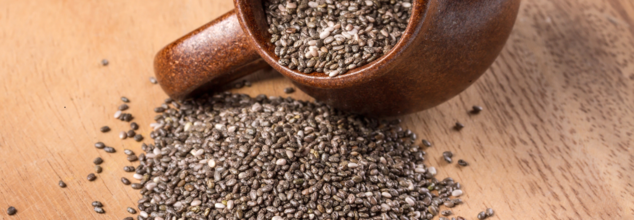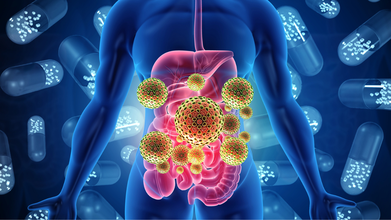- Health Conditions A-Z
- Health & Wellness
- Nutrition
- Fitness
- Health News
- Ayurveda
- Videos
- Medicine A-Z
- Parenting
This Fiber-Rich Superfood Is The Best Way To Start Your Day

Chia Seeds For Breakfast (Credit-Canva)
Mornings can often be challenging, especially when stress impacts digestion. Instead of relying on coffee for a quick fix, incorporating fiber-rich foods into breakfast can offer a more balanced and sustainable approach to regulating bowel movements and energy levels. Chia seeds are an excellent ingredient to boost breakfast's fiber content and provide other valuable nutrients.
Nutritional Powerhouse: The Benefits of Chia Seeds
Just two tablespoons (approximately one ounce or 28 grams) of chia seeds pack nearly 10 grams of fiber and 138 calories. Now an interesting thing about chia seeds is the presence of both soluble and insoluble fiber allows chia seeds to add bulk to stool and bind with water, which helps you have easier bowel movements. Beyond digestive health, chia seeds offer many other health benefits like the dietary fiber in chia seeds contributes to lowering cholesterol, controlling blood sugar levels, and reducing the risk of certain cancers. To maintain your digestive health and making sure it is in top-notch condition, consuming between 25 and 30 grams of fiber daily from sources like chia seeds is recommended. Chia seeds are also rich in other nutrients, including calcium, iron, magnesium, selenium, thiamin, and niacin. They also provide 5 grams of alpha-linolenic acid, an omega-3 fatty acid which is crucial for heart health and contributes almost 5 grams of protein.
Scientific Backing: Chia Seeds and Health
A 2023 review done in Food Science and Nutrition showed the potential health benefits of chia seeds are the fact that they contain omega-3s, fiber, and protein. These components may help you reduce triglycerides and improve HDL which is also known as the good cholesterol levels in your body. The fiber, unsaturated fats, and phenolic compounds in chia seeds can also aid in managing blood sugar by slowing carbohydrate absorption, the reason why junk foods increase your blood sugar is because it gets very easily absorbed in your body and converted into sugar for energy. The antioxidants present in chia seeds neutralize free radicals and reduce inflammation, which helps prevent chronic diseases. Many researches show that the nutrients in chia seeds may specifically may also help reduce the risk of pancreatic, liver, colorectal, and breast cancers.
Incorporating Chia Seeds into Your Breakfast
Chia seeds can sometimes be difficult to chew and digest in their dry form. Soaking them in water for about 15 minutes softens them. You will see how it creates a gel-like consistency due to the soluble fiber. This gel also helps you in digestion. Several methods exist for incorporating chia seeds into breakfast, while you can ingest them as they are soaked in water, you can also try these recipes
Smoothies
Add soaked chia seeds to your favorite smoothie recipe for a boost of healthy fats, protein, and fiber.Chia Seed Pudding
Combine chia seeds with your choice of milk (dairy or plant-based), a touch of honey, and cinnamon. Refrigerate for an hour, stir to remove clumps, and then let it set overnight.
Chia Seed Mousse
Blend half a cup of oats, three-fourths a cup of milk, and a tablespoon of chia seeds. Refrigerate overnight. This mousse can be customized with nuts, yogurt, fruit, or sweeteners.
Why is Butyrate Called Gut Petrol, Are You Low On It? Here's How Changing Your Diet Can Help

Credits: iStock
Your gut's petrol maybe running low and it is causing you all sorts of gut issues. But, what does it really mean?
Bloating that doesn’t settle, gas that feels unpredictable, sluggish digestion, and a constant sense that your gut just isn’t cooperating anymore. All of these complaints are becoming increasingly common, especially in urban India. While many people blame stress or food intolerances, experts say the issue may lie deeper, at the level of the gut microbiome. One key reason: falling levels of butyrate, a small but powerful compound essential for gut health.
Often described as the gut’s “petrol,” butyrate plays a critical role in keeping the digestive system resilient and balanced.
What Is Butyrate and Why Does It Matter?
Butyrate is a short-chain fatty acid (SCFA) produced when beneficial gut bacteria ferment dietary fiber. Think of it as the primary fuel source for the cells lining the colon. When enough butyrate is present, the gut lining stays strong, inflammation remains under control, and digestion functions smoothly.
When levels drop, the gut barrier weakens. This can lead to inflammation, slower digestion, immune imbalance, and even disruptions in metabolism and mood. In simple terms, low butyrate means the gut struggles to repair and protect itself.
A Silent Deficiency on the Rise
Recent gut microbiome analyses suggest that butyrate levels are declining sharply, particularly among adults living in metro cities. The drop isn’t limited to older age groups, even people in their 20s and 30s are showing early signs of imbalance.
While other SCFAs like propionate and acetate may remain relatively stable, butyrate appears to be the first to fall. This imbalance is increasingly being linked to rising cases of irritable bowel symptoms, unexplained digestive discomfort, and metabolic issues, even when routine tests appear normal.
What Low Butyrate Says About Your Gut
Low butyrate usually signals one of two problems, or both. Either the butyrate-producing bacteria are disappearing, or the diet lacks the fibers those bacteria depend on. Many people believe they eat “healthy,” yet still miss out on fiber diversity.
Without adequate fuel, beneficial bacteria struggle to survive. As a result, the gut ecosystem shifts, leading to symptoms such as bloating, cramps, urgency, alternating constipation and loose stools, fatigue, brain fog, and sugar cravings. These issues often go undetected because structural tests show no obvious damage.
How Modern Diets Are Fueling the Problem
Traditional Indian diets once provided a wide range of fibers through millets, dals, vegetables, fermented foods, and seasonal produce. Over time, these have been replaced by ultra-processed foods that are low in fiber and high in sugar and refined carbohydrates.
Add irregular meal timings, chronic stress, poor sleep, frequent antibiotic or painkiller use, and environmental pollution, and the gut microbiome takes a hit. The bacteria that produce butyrate simply fade away, much like shutting down a factory that no longer receives raw materials.
Rebuilding Butyrate Naturally
Restoring butyrate isn’t about quick fixes. Supplements may provide temporary relief, but they don’t rebuild the ecosystem. The foundation is dietary diversity.
Foods that help feed butyrate-producing bacteria include millets, legumes, whole grains, fruits, vegetables, seeds, and resistant starches. Everyday foods such as bananas, onions, garlic, oats, and cooked-and-cooled rice act as natural prebiotics. Fermented foods like curd and buttermilk also support microbial balance.
With consistent changes, the gut can slowly restart its butyrate production, though meaningful recovery may take several months.
Why Fiber Awareness Matters More Than Ever
Low butyrate isn’t just a digestive issue. It reflects how modern lifestyles are reshaping gut health at a population level. Improving fiber diversity could strengthen immunity, metabolism, and long-term health more effectively than treating symptoms later.
In many ways, restoring butyrate means returning to simpler, whole-food eating habits — and giving the gut the fuel it was designed to run on.
This Popular Christmas Food Could Raise Your Risk of Cancer And Heart Attack

Credits: Canva
Millions of people are stocking up on food for Christmas, planning the main meal and everything that comes with the festive stretch. What many do not realise is that there is a proven link between cancer and one much-loved item that often sits on the Christmas Day plate.
While sugar is often blamed for causing cancer, that belief is not supported by evidence. In fact, only two foods have a confirmed, direct link to cancer: alcohol and processed meat. And popular pigs in blankets clearly fall into the processed meat category.
Popular Christmas Food Could Raise Your Risk of Cancer And Heart Attack
To be clear, no one is saying that eating pigs in blankets on Christmas Day will give you cancer, just as no one suggests that a single glass of wine or sherry will lead to a diagnosis. That said, recent scientific evidence shows there is no truly safe level of alcohol consumption. In a recent report, Vivek Murthy, former surgeon general of the US Public Health Service, warned that alcohol use has been directly linked to at least seven different types of cancer, and that even light or moderate drinking can raise a person’s cancer risk.
As per Mirror, both processed meat and alcohol are classified as Group 1 carcinogens by the World Health Organisation, which means there is clear evidence they can cause cancer in humans. According to the WHO, “There is convincing evidence that the agent causes cancer.” Tobacco smoking and asbestos are also listed as Group 1 carcinogens, although the organisation clarifies that this does not mean alcohol and processed meat are as dangerous as smoking or asbestos.
Cancer Research UK also states clearly, “We know for certain that processed meat causes cancer. We are as confident about this link as we are about other established causes of cancer, such as tobacco and alcohol.”
What Is Processed Meat?
The World Health Organisation defines processed meat as “meat that has been transformed through salting, curing, fermentation, smoking, or other processes to enhance flavour or improve preservation.” Sausages and bacon are commonly cited examples by both the WHO and Cancer Research UK.Cancer Research UK explains that processed meats contain chemicals that are either added during processing or formed during cooking. These include nitrates and nitrites, which help keep processed meat fresh for longer. The organisation notes, “When we consume them, nitrates and nitrites can turn into N-nitroso chemicals (NOCs), which can damage the cells lining the bowel. This damage can increase the risk of bowel cancer.”
Why Does Alcohol Cause Cancer?
Alcohol increases cancer risk through biological processes that occur as it is broken down in the body. This means that any alcoholic drink, regardless of how expensive, high-quality, or mild it may seem, carries a cancer risk. There is no safe threshold for drinking alcohol. The WHO says cancer risk “rises significantly the more alcohol is consumed,” but also points out that “the latest available data show that around half of all alcohol-related cancers are caused by ‘light’ and ‘moderate’ drinking,” defined as less than 1.5 litres of wine, less than 3.5 litres of beer, or under 450 millilitres of spirits per week.
Processed Meat And Heart Disease
In 2021, researchers at Oxford University reported that the “largest review of all large-scale studies to date shows red and processed meat increase the risk of heart disease.”
Worldwide, coronary heart disease causes nearly nine million deaths each year, making it the leading cause of death globally. Scientists from the University of Oxford’s Nuffield Department of Population Health said their analysis “showed that each additional 50g per day of processed meat, such as bacon, ham, or sausages, was linked to an 18% higher risk of coronary heart disease.”
What Is The Best Time To Eat Dinner?

Credits: Canva
Eating is something we do every day, and its connection to our weight is undeniable. Most of us concentrate on what we eat, and rightly so, because the nutritional value and calorie content of food directly impact our weight. Yet, an increasingly important factor in weight management is when we eat. Nutritionist Pooja Makhija explains the science behind having early dinners, particularly in the evening, and how this aligns with the body clock to support overall weight management.
In an Instagram video, she writes in the caption, “You don't start digesting worse at night because of the food… you digest worse because melatonin has already risen,” adding, “Melatonin climbs 2–3 hours before your bedtime, dropping your insulin sensitivity by up to 50% and switching fat cells into storage mode. So the same meal hits very differently at 7 pm vs 10 pm.”
What Is Melatonin?
Melatonin is a hormone made by the pineal gland in the brain that helps control the body’s sleep-wake cycle. Its levels usually rise in the evening, peak during the night, and fall in the early morning. Many doctors even recommend melatonin supplements to help regulate sleep patterns, though they can sometimes cause side effects, so consulting a physician is advised, as per Healthline.
How Does Melatonin Affect Your Fat Storage In Body?
In her video, Pooja grabs attention by asking, “We all know that melatonin makes you sleepy. But what if I told you that melatonin wakes up your fat cells and makes them store more? Hadn't heard of that?”
She continues, “Melatonin isn’t just your sleep hormone. It’s your body’s night mode switch. As it rises in the evening, your metabolism slows down. Insulin sensitivity drops 25 to 50 percent, glucose clearance slows, and your fat cells switch from burning energy to storing it.” Referring to a study published in the *Clinical Endocrinology and Metabolism* journal, she adds, “People who ate dinner when their melatonin was high had a 34 percent higher glucose spike. Same people, same meal, same calories—just bad timing.”
What Is Front Loading Calories?
Front-loading calories is a way of eating where most of your daily calories are consumed earlier in the day, with a big breakfast and hearty lunch and a lighter dinner in the evening. This approach matches your meals with your body’s natural circadian rhythms, improving metabolism, insulin response, and appetite control. It helps with weight management and energy levels by taking advantage of the morning metabolism, reducing late-night cravings, and supporting better sleep.
What Is The Correct Time To Have Dinner To Prevent Fat Storage And Weight Gain?
Pooja Makhija says the most effective method to prevent melatonin from triggering fat storage is to eat early dinners and front-load calories during the day.
“So when most of your calories land late at night, it’s at a time when your biology is saying, ‘I’m done for the day; I’m not burning more.’ In contrast, front-loading calories with a big breakfast, solid lunch, and small dinner means you’re eating when melatonin is low. Your insulin is sharp, mitochondria are active, and your body is in daytime burning mode,” she explains.
She concludes with a reminder: “Your fat cells have melatonin receptors, and they behave differently depending on the time of day. Front-loading isn’t a hack—it’s circadian biology. Melatonin guides your metabolism. So eat in tune with your body clock, not against it, and notice the difference.”
According to Healthline, the ideal dinner time for better melatonin regulation and metabolism is 2–3 hours before bedtime—before your body naturally begins releasing melatonin—to avoid insulin spikes and fat storage.
© 2024 Bennett, Coleman & Company Limited

